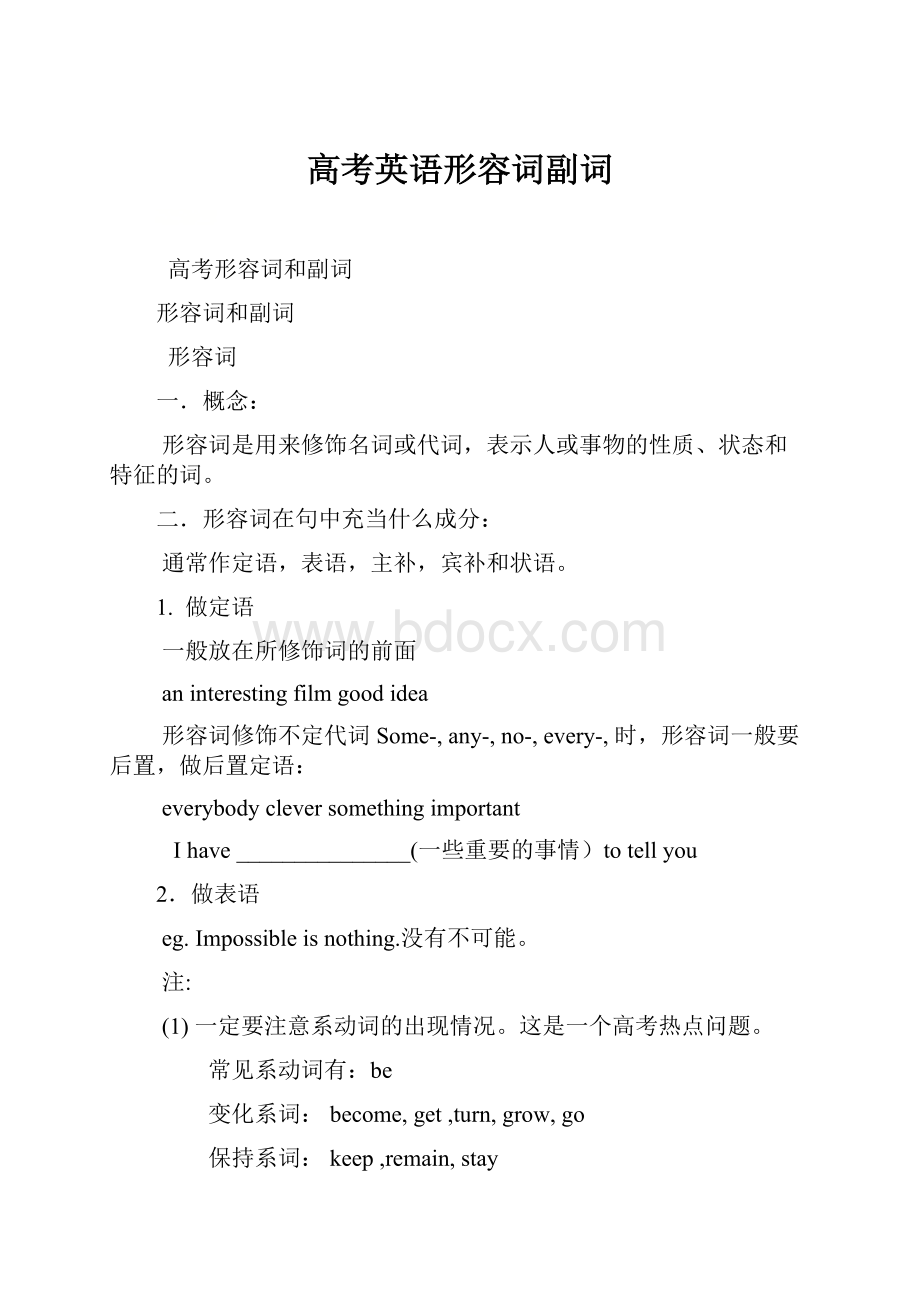高考英语形容词副词.docx
《高考英语形容词副词.docx》由会员分享,可在线阅读,更多相关《高考英语形容词副词.docx(13页珍藏版)》请在冰豆网上搜索。

高考英语形容词副词
高考形容词和副词
形容词和副词
形容词
一.概念:
形容词是用来修饰名词或代词,表示人或事物的性质、状态和特征的词。
二.形容词在句中充当什么成分:
通常作定语,表语,主补,宾补和状语。
1.做定语
一般放在所修饰词的前面
aninterestingfilmgoodidea
形容词修饰不定代词Some-,any-,no-,every-,时,形容词一般要后置,做后置定语:
everybodycleversomethingimportant
Ihave_______________(一些重要的事情)totellyou
2.做表语
eg.Impossibleisnothing.没有不可能。
注:
(1)一定要注意系动词的出现情况。
这是一个高考热点问题。
常见系动词有:
be
变化系词:
become,get,turn,grow,go
保持系词:
keep,remain,stay
感观系词:
look,smell,taste,feel,sound,appear,seem,proveetc.
(2)
①某些以a开始的形容词只做表语,不做定语。
afraid,alike,alone,asleep,awake,alive
②某些表身体健康状况的形容词只能做表语,不做定语
well,illfaint
3.做补足语。
eg.Weconsidertheplanworkable.我们认为该计划可行。
4.做状语
表状况、原因、结果等。
这也是应注意的一点。
Eg.1)Hewenttobed,coldandhungry.
2)Knowingthetruth,thebossstoodthere,speechless.
得知真相后,老板无言以对。
(speechless为状语,注意形容词作状语,通常用于固定句式,该形容词并非修饰谓语
动词,而是说明前面名词的性质或状态)。
例:
Whenitwashisturntodeliverhisspeech,________,hewalkedtowardsthemicrophone.A.nervouslyandA.embarrassinglyB.nervousandembarrassedly
C.nervouslyandembarrassingD.nervousandembarrassed
解析:
该题考查形容词作状语。
形容词一般作定语,但也可作状语。
如:
Helayinbed,awake.再如:
Herhusbandcameback,drunk.答案:
D
三.形容词的比较级和最高级变化规则
规则变化
1.一般情况加er,estsmaller,smallest
2.以e结尾加r,stlarger,largest
3.以"辅音字母+y"结尾的词改y为i,再加er,estbusier,busiest
4.重读闭音节结尾,末尾只有一个辅音字母双写末尾辅音字母,加er,estfatter,fattest
5.多数双音节和多音节的词加moremostmorebeautiful, mostimportant
不变化规则
原级比较级最高级
good,wellbetterbest
bad,ill,badlyworseworst
many,muchmoremost
littlelessleast
farfarther,furtherfarthest,further
oldolder,elderoldest,eldest
例:
改错
1.Fartherexplanationisunnecessary
2.Airplanescanflyfurtherandfasterthanthefastestbird.
四.具体用法:
1.原级的用法
1)as原形as A与B一样……
eg.Thetraintravelsasfastasthe3:
55train.
Hehasnotasmuchmoneyashisfriend.
2)notas(so)原形as A与B不一样……
eg.Sheisnotas(so)beautifulashersister.
Theworkisnotas/sodifficultasyouimagine.这项工作不是像你想像的那么难。
注意
貌似同级比较结构的一些习惯用语
①asfaras词汇意义:
“和…一样远;一直到…”。
引申义表程度或范围,作连接词引导从句,表“尽…;就…”。
②aslongas词汇意义:
“和…一样长”。
引申义为“只要…”,引导条件状语从句,相当于onlyif。
③aswellas词汇意义:
“和…一样好”,可作并列连词,意思是“和;以及”。
句尾用aswell,作“也”讲。
④assoonas词汇意义:
“尽快”,引申义为“一…就”,作连词引导时间状语从句,相当于themoment(when)。
2.比较级的用法
1)比较级+than
eg.Healthismoreimportantthanwealth.
2)比较级+比较级“越来越…”
higherandhigher
moreandmoreimportant
3)the+比较级,the+比较级 “越…,越…”
eg.Thequickeryougetready,thesoonerwe'llbeabletoleave.
4)the+比较级+ofthetwo “两者中较…的一个”
Thetallerofthetwoboysismybrother.两个男孩中较高的那位是我哥哥。
5)否定+比较级表示最高级“最…不过”
eg.Hisworkcouldn'tbeworse.
Howbeautifullyshesings!
Ihaveneverheardabettervoice.
—Areyousatisfiedwithwhathesaidatthemeeting?
—你对他在会议上说的满意吗?
—No.Itcouldn’thavebeenworse.——不,不能再差了。
6)比较级+thananyother+名词单数、
比较级+thananyoftheother+名词复数、
比较级+thananyoneelse等。
补充:
senior(年长的,高级的),
junior(年幼的,初级的),等词与to连用,表示比较级。
superior(优越的),
inferior(下等的,低劣的)
eg.Heisthreeyearsseniortome.
Heisthreeyearsolderthanme.
3.最高级的用法
1)the+最高级+of/in+比较范围 (…之中最…)
Ofallthingsintheworld,peoplearetheprecious.
2) the+序数词+最高级
四.比较级结构的修饰语
1.用于原级之前:
almost,nearly,just,exactly,quite,half,twice,threetimes,athird,etc.
eg.Johnisalmostastallasyou.
Theriveristhreetimesaslongasthatone.
Wehaveathirdasmanystudentsaswehadlastterm.
2.用于比较级前
alot,much,abit,even,alittle,still,agreatdeal,far,rather,twoyears,tenpercent,threetimesetc.
eg.Thestudentsstudyevenharderthanbefore.学生们学习比以前更努力了。
Acarrunsagreatdealfasterthanabike.汽车比自行车跑得快得多。
It'scoldthisyear,butit'sevencolderlastyear.
Weproduced6%moregrainthisyearthanwedidlastyear.
3.用于形容词和最高级前
thevery,muchthe,byfarthe,thefirst/second
eg.Thishatisbyfarthelargestintheworld.
Goldistheverymostvaluableofallmaterials.
ThebridgebeingbuiltnowisbyfarthelongestacrosstheYellowRiver.
目前正在建的那座桥是横跨黄河之上的桥当中最长的桥。
I’dliketobuythesecondmostexpensivecamera.我想买仅次于最贵的照相机。
五.形容词的构成
1.本身为形容词nice,red,glad
2.形容词后缀
-able,-ful,-less,-ous,-al,-ent,-en,-some
名词+y结尾的形容词
3.ly结尾的形容词
friendly,timely,lovely,deadly,daily,weekly,yearly
deadly,costly,likely,lively(,lovely。
4.复合形容词warm-hearted,good-tempered,easy-going,duty-free
六.顺序
在名词前做定语,为最常见用法。
请注意多个形容词(含其它起形容词作用的词)做前置定语的顺序。
"县官行令杀国才。
"这一句就概述了形容词顺序问题。
即:
限(冠词[物主代词、指示代词]数词等)观(描绘)形(大小、形状等)龄(年龄、新旧等)色(色彩)国(国籍、出处等)材(材料、功用等)
asmallroundtable
atallgraybuilding
ThisaprettysmallroundoldbrownChinesewoodenwritingdesk
补充:
cannot/never与enough或too连用表示:
无论怎样都不过分;越……越好。
—Iwasridingaloneinthestreetandallofasudden,acarcutinandknockedmedown.
——我正在大街上独自一人骑自行车,突然一辆小汽车强行超车把我撞倒了
—Youcanneverbetoocarefulinthestreet.——在大街上你越仔细越好。
考点解析
考点二:
倍数表达法
表示倍数的句型:
(1)Ais+倍数+比较级+than+B
(2)Ais+倍数+as+原级+as+B
(3)Ais+倍数+the+名词(size,length,height等)+of+B
(4)Ais+倍数+that+of+B
(5)Ais+倍数+what引导的名词性从句
①Thisbuildingisthreetimeshigherthanthatone.
Thisbuildingisthreetimesashighasthatone.
Thisbuildingisthreetimestheheightofthatone.这个建筑物是那个建筑物的3倍高。
②Theoutputofthisyearis3timesthatof2012.
=Theoutputofthisyearis3timeswhatitwasin20012.今年的产量是2012年的三倍。
1Myuncle’shouseinthedowntownareaismuchsmallerthanours,butitistwice________expensive.
A.asB.soC.tooD.very
解析:
答案:
A
2.Peter’sjacketlookedjustthesameasJack’s,butitcost________his.
A.asmuchtwiceasB.twiceasmuchas
C.muchastwiceasD.astwicemuchas
解析:
答案:
B
3.Whenyoustudythelocalmap,you’llfindthistownis________.
A.twicethesizeofthatoneB.twiceasalargetownasthat
C.twiceaslargerasthatoneD.twiceaslargeratownasthat
解析:
答案:
A
2.拓展:
“as+形容词+(a/an)+名词+as”表示同级比较,注意中间的形容词和名词并列时各自所在的位置。
Itisgenerallybelievedthatteachingisasmuchanartasitisascience.
例:
1.Believeitornot,swimmingis________asanytoloseunwantedweight.
A.awayasgoodB.asagoodwayC.asawaygoodD.asgoodaway
解析:
考查固定短语。
as...as表示“和……一样”,固定表达方式有“as+adj./adv.+as”“as+adj.+a/an+n.+as”等。
答案:
D
副词
1.副词的主要分类
时间副词:
now,then,early,late,lately,recently
地点副词:
there,here,below,above
频度副词:
always,usually,often,sometimes,seldom,never
方式副词:
well,slowly,hard,badly
程度副词:
still,even,very,rather,much,hardly,quite
疑问副词:
how,when,where,why
连接副词:
when,where,why,whether
关系副词:
when,where,why
其他副词:
also,not,only,too
2.副词的语法功能
副词在句中可作状语、表语、宾语补足语和后置定语。
(1)作状语,修饰形容词、动词、介词短语和副词,也可修饰整个句子。
Icanrunveryfast.我跑得非常快。
注意:
1.有些副词还可以作连词,作副词时常放在句末。
如:
though,(ever)since,incase等
Heisold.Heworkshard,though.
=Thoughheisold,heworkshard.虽然他年事已高,但他工作还是很努力。
2.有些副词置于句首可修饰全句,作评注性状语。
如:
obviously,naturally,surprisingly等
Fortunately,hewasnotdrownedandwassavedbythePLA.
幸运的是,他没被淹死,被解放军给救了。
(2)其它
作表语,在系动词后。
Classisover.下课了。
Timeisup.时间到。
作定语,放在被修饰词之后。
Doyouknowthegirlupstairs?
你认识楼上的女孩吗?
Soonyouwillbeacquaintedwiththepeoplearound.不久你就会熟悉这附近的人。
Areyoucontentwiththelifehere?
你对这儿的生活满意吗?
Haveyouthoughtofthewayout?
你有没有考虑这一出路?
作补语
Wewereshownaroundbytheyoungman.
Lethimin/out.I’llseeyouoffatthestation.
作介词宾语
It'salongwayfromheretoyourschool.
Hehaslivedheresincethen.
3.同根副词的区别
有些副词有两种形式,一种与形容词同形,另一种是形容词加后缀-ly构成,这两种副词有时意义相近,但有时含义完全不同,使用时应该注意。
1)high和highly
high的意思是“高”,表示空间高度;
highly的意思是“高度地;非常地”,表示程度。
Thebirdisflyinghighupinthesky.鸟在空中高高地飞。
Wespokehighlyofher.我们高度赞扬了她。
2)wide和widely
wide表示空间宽度,意为“充分地;大大地”,
widely表示范围,意为“广泛地”。
Sheopenedthedoor______.她把门完全打开。
Englishis______used.英语广泛地被应用。
3)deep和deeply
deep的意思是“深”,表示空间深度,
deeply时常表示感情,意为“深深地”。
Hewentonstudyingdeepintothenight.他继续学习直到深夜。
Thistouchedherheart______.这深深打动了她的心。
4)close和closely
close的意思是“靠近”;
closely的意思则是“仔细地;密切地”。
Theylive______tothemuseum.他们住在靠近博物馆的地方。
Weare______watchingthedevelopments.我们正密切注视情况的发展。
5)direct和directly
direct作副词用往往用于表示时间、路程和方式等概念中,表示“直接地;直达地”;
directly多用于借喻,表示“坦率地;截然”,有时还可用来表示“立即,马上”的意思。
Theplanegoes______fromLondontoHoustonwithoutstopping.
飞机由伦敦直达休斯敦,中途不停。
Hisviewis______opposedtomine. 他的观点与我的截然相反。
6)late和lately
late的意思是“晚”,
lately意思是“最近”。
Manypeoplesleep______onSundaymorning.许多人在星期天早晨睡懒觉。
Whathaveyoubeendoing______?
最近你在干什么?
7)near和nearly
near的意思是“在附近”,
nearly的意思是“几乎”。
Myauntlivesquite______.我姑姑住得相当近。
Theboy______fellintotheriver.那男孩险些跌人河中。
8)free和freely
free是“免费”;
freely是“自由地,随意地”。
Youcaneatfreeinmyrestaurant. 你可以在我的餐馆免费用餐。
Youmayspeakfreely.你可以直言。
9)hard和hardly
hard是“努力地”,
hardly是“几乎不”。
Ihavebeenworkinghardallmorning.我辛辛苦苦地干了一上午活。
Wecanhardlybelieveit.我们简直不能相信。
10)most和mostly
most是“最,非常”,
mostly是“主要地”。
Whatinterestedhermostwasthelongitudeline.最让她感兴趣的是经度线。
11)firm和firmly
二者意思基本相同,都表示“坚定地,牢固地”的意思。
根据用法习惯,firm常与hold和stand等搭配,其他情况多用firmly。
Sheholdsfirmtoherprinciples.她坚持自己的原则。
Theconceptof“customersfirst”shouldbefirmlyrootedinthemindofeveryshopassistant.
“顾客第一”的概念应牢牢地树立在每个营业员的心中。
Theaudienceconsistedmostlyofwomen.观众主要是妇女。
12)dead和deadly
dead作副词时表“完全地;绝对地”;
deadly一般作形容词用,意为“致命的”,作副词表“死一般地;极度地”。
Themanlayontheground,deaddrunk.那个人躺在地上,喝得烂醉。
Hisfacewasdeadlypale.他的脸死一般地苍白。
Ineeditdeadly.我好需要它!